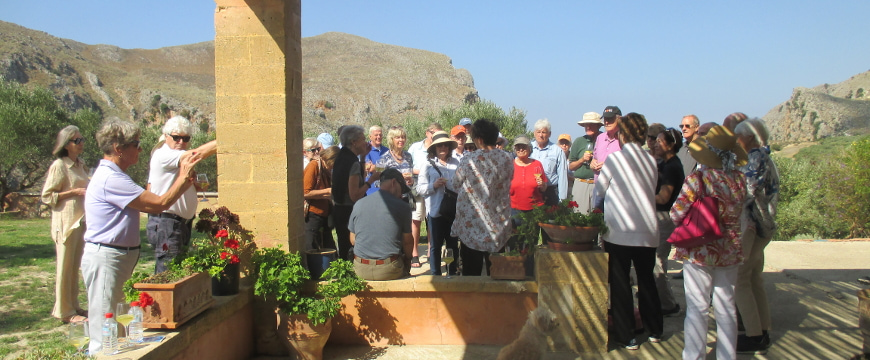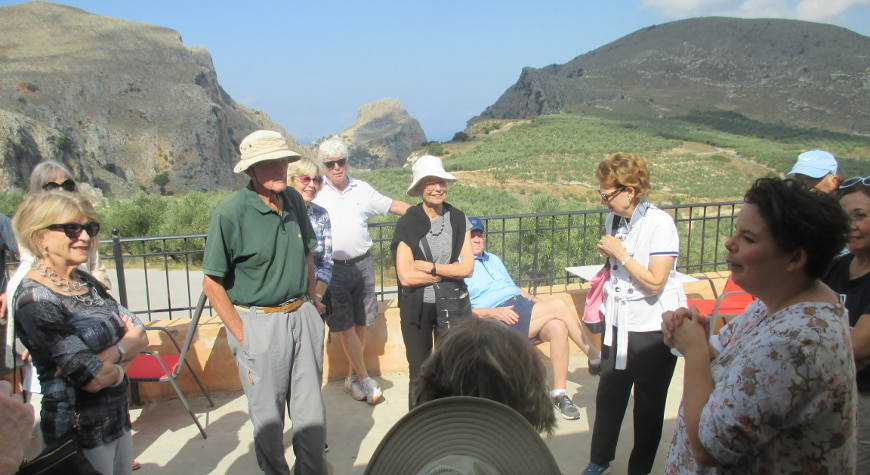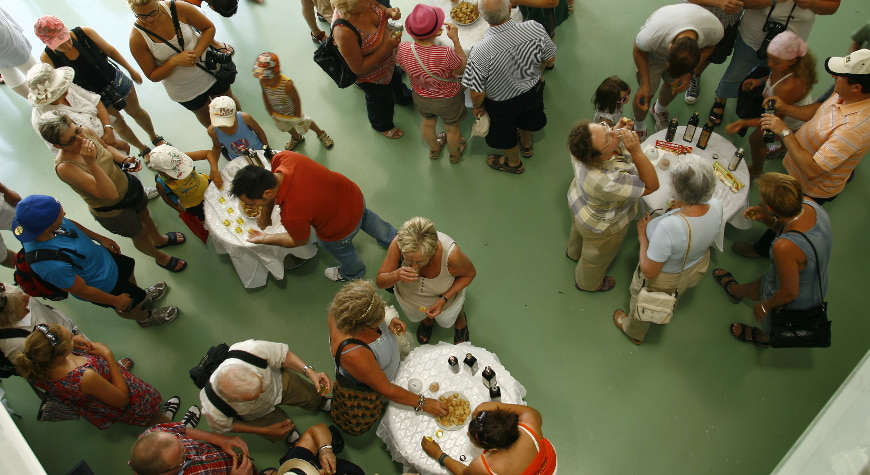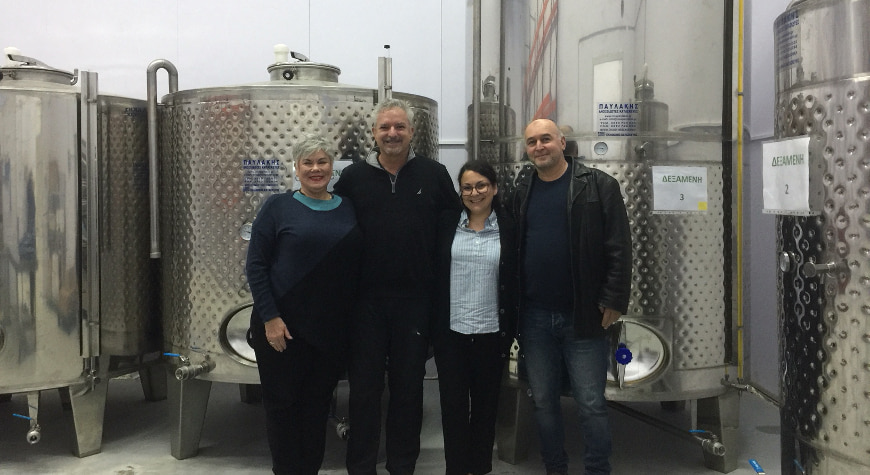From the southern island of Crete to northern Chalkidiki, Greek olive oil companies welcome international visitors to learn all about olive oil. In a variety of facilities and settings, tourists can explore the silvery green of olive groves, the health benefits of olives, and traditional and modern ways of getting the flavorful juice out of this fruit.
Visiting Crete, Charles Balestri was struck by the significance of olives: “Whether you eat them or use their oil, the olives from Crete put me in communion with the experience of Cretan life. Strong, subtle, and rooted in the land.” Touring the island during a Princeton University Class of 1963 mini reunion, Balestri and his cohorts admired the sculptural beauty of the ancient olive tree of Vouves, explored the little museum next to it, and heard about olive oil and its production at Biolea in Astrikas, with its updated version of a traditional stone mill and hydraulic press.
These reunited Americans asked many questions about types of olive oil, how long it lasts, how it can be used, and how it is produced. After their discussion, they enjoyed a catered olive oil rich lunch with a spectacular view of Biolea’s olive groves stretching toward dramatic hills and cliffs. One group member decided to “start looking for Greek extra virgin cold pressed olive oil” closer to home, although another was “sorry there aren’t more Greek olive oils available in the U.S.!” One Princeton alum is now determined “to eliminate mayonnaise in my tomato sandwich and replace it with olive oil.”
Near the ancient olive tree of Vouves in the same part of northwestern Crete, Terra Creta hosts visitors who are impressed by this larger company’s state of the art olive mill facilities “and the cooperation we have with farmers,” according to Emmanouil Karpadakis. “Moreover, they like the environmentally friendly operation and the taste of our extra virgin olive oil” (EVOO) and are very interested in “the authenticity and the natural production steps in the olive mill.” Terra Creta’s visitors can choose a 30 to 60 minute tour and explanation, a more detailed discussion of the quality, health benefits, and flavors of EVOOs in an in-depth PRO olive oil tasting seminar, or a combination of a tour and cooking class.
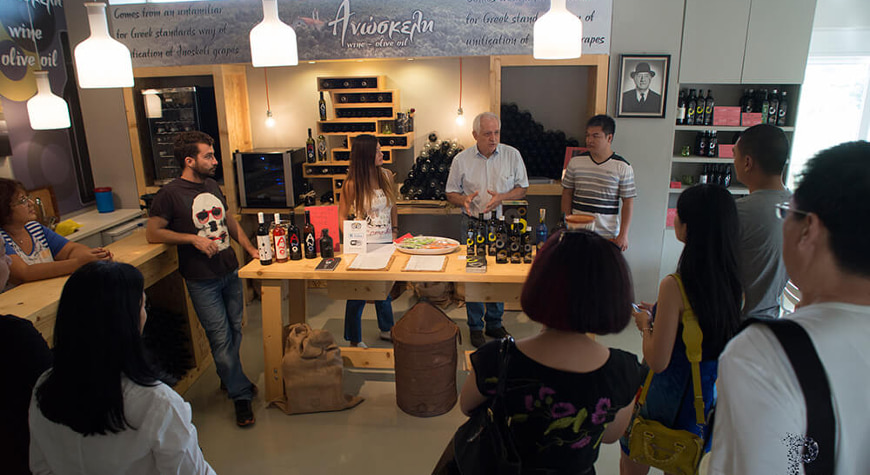
Also in the same Kolymvari Protected Designation of Origin (PDO) area in Crete, Anoskeli combines tours of their renovated village olive mill and their boutique winery in a building nestled among grapevines and olive groves in the foothills of the White Mountains. After their tour, with its thorough explanation of every stage of both the olive oil and winemaking processes, from the field all the way to the bottle, guests can taste Anoskeli’s wines, tsikoudia (raki), and extra virgin olive oil. During the tasting experience, according to Eftychia Georgiakaki, they learn to identify each product’s unique characteristics. Visitors are often curious about how many olives and how much olive oil come from each tree.
North of Crete in the Peloponnese peninsula, Maria Spiliakopoulou of Oliorama told Greek Liquid Gold that her company will be starting tours of a traditional olive mill and small museum in the summer of 2020, with a short seminar to provide an overview of how to choose a good olive oil. Visitors will also have the options of a longer, more detailed seminar, discussing food pairings, and touring the area of Ancient Olympia. This November, Oliorama will be heading to the USA to lead a seminar in New York City which they hope to follow up with other events in the US.
Near the Corinth Canal west of Athens, tourists often stop at the Loutraki Oil Company, makers of Elea EVOO, to combine “their vacation with a stroll through our olive groves, conversing and asking questions about olive oil production” and chemists’ analysis of its quality, as well as sampling their EVOO, Maria Katsetos told Greek Liquid Gold. Harvest time visitors can also witness the production process in the olive mill and the bottling factory. According to Katsetos, visitors “find the olive oil industry very interesting and exciting, and they enjoy the taste of our olive oils.”
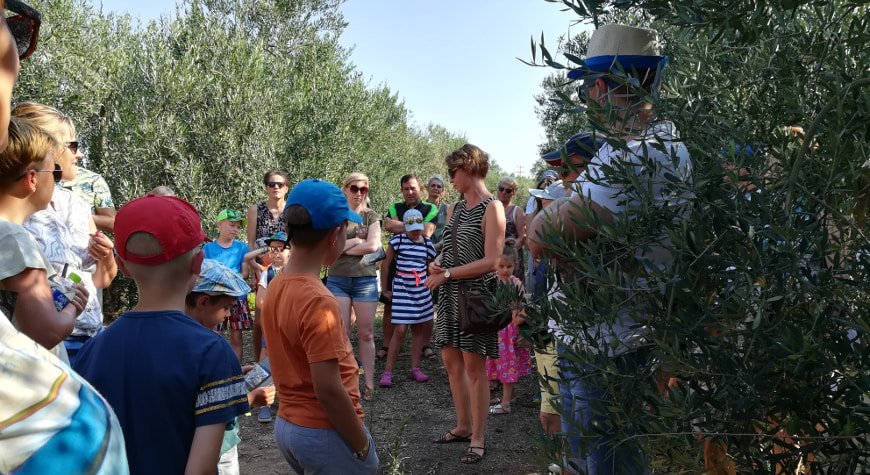
In the northern part of the country, Eleni Zotou of Golden Tree tours the countryside in Chalkidiki with tourists and students, talking about how to harvest olives and taking them to an olive processing plant. There they conclude by tasting olives, olive oil, bread, herbs, and traditional handmade Greek pies. Chalkidiki is famous for its table olives, with their Protected Designation of Origin (PDO) Chalkidikis. As Zotou tells visitors, the area is also becoming known for its early harvest extra virgin olive oil (Agourelaio), which is the only early harvest EVOO in Greece with its own certified PDO.
Also in Chalkidiki, Yanni’s Olive Grove gives free one-hour tours every spring and summer. As Evi Psounou Prodromou told Greek Liquid Gold, they start by visiting the olive groves “to see the intelligent olive tree agriculture systems (electronic sensors, meteorological stations, and irrigation systems). After that, we visit our facilities, where they can taste our EVOO and see a video about EVOO production. Our tour includes info about early harvest EVOO and its health benefits. We explain how the modern online olive tree agriculture system” produces excellent olives and reduces costs for both producers and consumers. Visitors are fascinated by the “unique high tech way” the team at Yanni’s can use their smart phones to “‘speak directly’ with every olive grove, as if it is a small child, to understand what exactly it needs”—food, water, or medicine (fertilizer, irrigation, or fungicide)--and when it needs it.
Prodromou reports that their visitors used to think Greek olive oil was mainly produced using traditional methods, “with just some hints of new techniques.” After their tour of Yanni’s Olive Grove, they decide “Greece is now becoming a modern olive tree cultivator, so Greek EVOOs can enter demanding markets” where consumers seek excellent EVOO at a good price.
Summer 2021: If you are planning for this year, please contact the businesses that interest you to check on their current schedule, which may differ from other years.
Thanks to Golden Tree, Anoskeli, Terra Creta, and Yanni’s Olive Grove for the photos of their agrotourism activities. The photos from Biolea were taken by Lisa Radinovsky.
All businesses, organizations, and competitions involved with Greek olive oil or agrotourism or food tourism in Greece, as well as anyone else interested in supporting Greeks working in these sectors, are invited to consider the advertising and sponsorship opportunities on the Greek Liquid Gold: Authentic Extra Virgin Olive Oil website. With more than 200 original articles and recipes, the only wide-ranging English-language site focused on news and information from the Greek olive oil world has reached readers in 195 countries around the globe. The high quality of Greek Liquid Gold’s reporting has been recognized by Greek and American embassies and consulates, awarded by the Association of Cretan Olive Municipalities, and cited in various international publications.


